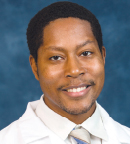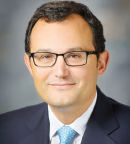New hematology research, presented at the Best of ASCO New Orleans meeting, may help to guide the use of stem cell transplant in hematologic malignancies. At the meeting, Guillermo Garcia-Manero, MD, PhD, of The University of Texas MD Anderson Cancer Center, Houston, and Tycel Phillips, MD, of the University of Michigan, Ann Arbor, discussed this year’s top selected abstracts in allogeneic and autologous hematopoietic cell transplant, originally presented at the 2017 ASCO Annual Meeting in Chicago.1,2
Transplant Feasible in Patients With HIV
A study by Ambinder et al explored the feasibility and safety of allogeneic hematopoietic cell transplant (allo-HCT) for hematologic malignancies in patients with human immunodeficiency virus (HIV).3 For years, transplant in this patient population has been generally regarded as risky and has raised concerns about fatal infections.

Tycel Phillips, MD
“The concept of this study is very important—the question of whether or not you can do allo-HCT in HIV-positive patients,” said Dr. Garcia-Manero. “For years these patients have been excluded from major clinical trials.”
In this prospective multicenter trial, the first of its kind, investigators enrolled 17 patients to undergo allo-HCT between 2012 and 2015. Patients were aged 15 years or older with drug-susceptible HIV and adequate organ function. Nine patients had acute myeloid leukemia, two had acute lymphocytic leukemia, two had high-risk myelodysplastic syndrome, one had Hodgkin lymphoma, and three had non-Hodgkin lymphoma, all beyond first complete remission. The primary endpoint was 100-day nonrelapse mortality.
Patients were required to have an 8/8 human leukocyte antigen–matched related donor, or at least a 7/8–matched unrelated donor. Patients received fully ablative (n = 8) or reduced-intensity (n = 9) -allo-HCT and standard immunosuppressive therapy post transplant.
Even patients with no detectable HIV in standard clinical assays will have a detectable viral reservoir, so the investigators also measured the viral reservoir in latently infected CD4-positive T cells. HIV outgrowth assays were performed with resting CD4-positive T cells at baseline and at 1 year in all patients who had clinically undetectable HIV plasma RNA.
NEW FINDINGS IN STEM CELL TRANSPLANT
- Allogeneic hematopoietic cell transplant in patients who are HIV-positive was deemed safe and feasible, and according to the investigators, should be considered the standard of care for HIV-positive patients who meet usual eligibility criteria.
- Autologous stem cell transplant may be considered in patients with follicular lymphoma who experience early chemoimmunotherapy failure.
At 100 days, the investigators observed no nonrelapse mortality. A total of 13 patients were in complete remission, 4 had relapsed/progressive disease, and 8 achieved complete chimerism. “These outcomes are similar to what we see in other populations and potentially even better,” Dr. Garcia-Manero observed.
Cumulative incidence of grade II to IV graft-vs-host disease was 41%. Infectious HIV was detected by viral outgrowth assay in two of three patients who were mixed chimeras, but patients who achieved complete chimerism (n = 2) did not have HIV detectable by viral outgrowth assay.
A total of eight deaths were due to relapsed/progressive disease (n = 5), acute graft-vs-host disease (n = 1), adult respiratory distress syndrome (n = 1), and liver failure (n = 1). “I don’t see any causes of death here that we don’t see with non–HIV-positive patients who go through stem cell transplant,” he noted.
Overall survival at 6 months was 82%, and at 1 year, it was 57%. “These numbers are quite exciting and similar to what you would see in a non-HIV population,” he added.
Because there was no 100-day nonrelapse mortality and no infectious deaths at 1 year, the investigators concluded that allo-HCT should be considered the standard of care for HIV patients who meet usual eligibility criteria.
“Transplant in HIV-infected patients is safe,” said Dr. -Garcia-Manero. “There should be no reason why we can’t treat these patients on clinical trials.”
Autologous vs Matched Sibling/Matched Unrelated Donor
Autologous stem cell transplant (auto-HCT) improves progression-free survival compared to conventional chemotherapy for relapsed follicular lymphoma, but high-risk follicular lymphoma patients with early chemoimmunotherapy failure traditionally have a 5-year overall survival of only about 50%.4
Based on this rationale, Godfrey et al used the Center for International Blood and Marrow Transplant Research database to compare outcomes with auto-HCT vs either matched sibling donor or matched unrelated donor transplant, as the first transplant approach in follicular lymphoma patients who had relapsed within 2 years of front-line chemoimmunotherapy.5
The study evaluated 440 adult follicular lymphoma patients who underwent transplant between 2002 and 2014, received first-line rituximab (Rituxan)-based chemoimmunotherapies, and displayed evidence of early chemoimmunotherapy failure.

Transplant in HIV-infected patients is safe. There should be no reason why we can’t treat these patients on clinical trials.— Guillermo Garcia-Manero, MD, PhD
Tweet this quote
The 5-year adjusted probabilities of progression-free survival following auto-HCT, matched sibling donor transplant, and matched unrelated donor transplant were 38%, 52%, and 43%, respectively. “There appears to be a benefit for matched sibling donor transplantation compared to autologous stem cell transplantation,” Dr. Phillips noted, “whereas there is no statistical difference between autologous and matched unrelated donor transplant or matched sibling donor and matched unrelated donor transplant.”
Five-year overall survival was significantly higher following autologous (70%) or matched sibling donor transplant (73%) when compared to matched unrelated donor transplant (49%). “The overall survival differences noted can be attributed to the non–relapse--related mortality associated with matched unrelated donor transplantation, especially when comparing the difference in outcomes of the patients who received an autologous stem cell transplant vs matched unrelated donor transplants in this patient population,” he noted.
“Overall, I believe lymphoma specialists tend to refer follicular lymphoma patients very late for autologous stem cell transplantation, which—as the presented data indicate—may not be to the benefit of our patients,” said Dr. Phillips. “Patients who are potential candidates for transplantation should be referred sooner to maximize the potential benefits of this treatment modality, which may require us to reevaluate some of our treatment algorithms in this patient population.”
The primary cause of death in the auto-HCT group was relapse of primary disease (83%), whereas the two other transplantation arms experienced a higher incidence of non–relapse-related mortality, especially in matched unrelated donor patients, where more than half of the deaths were not related to disease relapse and, specifically, 21% of patients died from graft-vs-host disease.
According to the investigators, auto-HCT for follicular lymphoma patients with early chemoimmunotherapy failure is associated with low non–relapse-related mortality, as well as excellent 5-year overall survival rates (> 70%). They maintain that a prospective trial confirming the role of HCT in this patient population is warranted.
According to Dr. Phillips, matched sibling donor transplant and autologous transplant have notably higher overall survival compared to historical controls and should be strongly considered for early-relapsing follicular lymphoma patients. “But in patients who do not have a sibling match, autologous stem cell transplant is something that should be considered early on in any follicular lymphoma patient who fails to achieve an appropriate response to chemoimmunotherapy or who relapses within 2 years of treatment completion, which is something that has not historically been our general practice,” he said. ■
DISCLOSURE: Drs. Phillips and Garcia-Manero reported no conflicts of interest.
REFERENCES
1. Garcia-Manero G: Hematologic malignancies: Leukemia, myelodysplastic syndromes, and allotransplant. Best of ASCO New Orleans. Presented July 28, 2017.
3. Ambinder R, Wu J, Logan B, et al: Allogeneic hematopoietic cell transplant for hematologic malignancies in human immunodeficiency virus infected patients. 2017 ASCO Annual Meeting. Abstract 7006. Presented June 6, 2017.
4. Casulo C, Byrtek M, Dawson KL, et al: Early relapse of follicular lymphoma after rituximab plus cyclophosphamide, doxorubicin, vincristine, and prednisone defines patients at high risk for death. J Clin Oncol 33:2516-2522, 2015.
5. Godfrey J, Smith SM, Ahn KW, et al: Autologous versus matched sibling donor or matched unrelated donor allogeneic hematopoietic cell transplantation in follicular lymphoma patients with early chemoimmunotherapy failure. 2017 ASCO Annual Meeting. Abstract 7508. Presented June 3, 2017.

